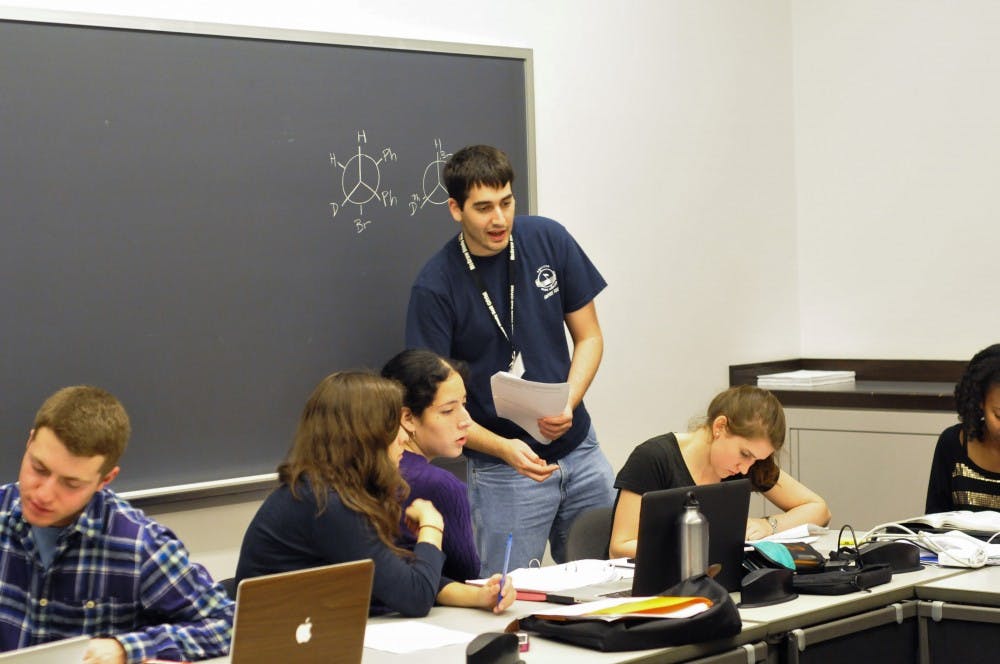Though McGraw Study Hall remains a popular academic-help resource, with 5,800 student visits recorded by the McGraw Center in the last academic year, its popularity has also been a source of dissatisfaction for some students because of the overcrowding and shortage of student tutors.
According to data collected by the McGraw Center, in the 2012 fall semester, 62 tutors regularly worked one shift a week, and in spring 2013, only 59 did so. On “average” nights, 80 to 100 students go to the Study Hall for free group tutoring, McGraw Associate Director Nic Voge estimated. The center offers help for quantitative problem-solving courses such as introductory chemistry, physics, economics, mathematics and statistics, according to its website.
While Meaghan O’Neill ’17 described her McGraw experience as positive overall, she noted that tutors are inaccessible when larger numbers of students come in for help.
“The first time I went to chemistry, there were like 25 or 30 students in the room, and there were no chairs. My friends and I were standing in the back. And there were three tutors for all the students. No one was really being helped; they were kind of just working on the problem sets with their friends next to them,” she said.
O’Neill said she would suggest fixing the problem by hiring more tutors or expanding McGraw’s hours. Study Hall currently runs from 7:30 p.m. to 10:30 p.m., Sunday through Wednesday.
Similarly, Hilary Bernstein ’14 noted that although the tutors at McGraw are “very good,” it was difficult for her to interact with them because of the large number of students seeking help.
“There were definitely nights where it was very crowded, and it was a struggle to get the one-on-one attention, or even any attention,” she said.
Voge acknowledged that there are an insufficient number of tutors to meet the demands of students. “I think we have very good tutors, and I’m very happy with our training. What we lack is space for the numbers of students and the numbers of tutors,” he said.

Tutors are sometimes recruited based on professor recommendations, but students can also apply if interested. Applicants must demonstrate expertise in their chosen subject, complete an interview and attend training on McGraw Study Hall’s goals, Voge said.
However, it may be student expectations of the purpose of Study Hall, and not the inadequate number of tutors, that are the source of dissatisfaction.
“Some people have the misapprehension that it is designed to help them finish their homework,” Voge noted, while the intent of the program is more complex.
According to the list of McGraw Study Hall Objectives given to student tutors, the goals of the Study Hall are not to complete problem sets but to develop conceptual knowledge of the subject through group collaboration. The tutors are present to aid this process, not provide one-on-one tutelage, Voge added.

“If the students said, ‘Hey, you know what we can run our own study group —we don’t need a tutor,’ we would say, ‘Fantastic!’ Why? Because that ability to run an effective study group is far more valuable because upper-division courses don’t offer support,” he said.
Economics tutor Christopher McConnell ’14 said that although he enjoys tutoring, students should not come to Study Hall expecting to be given answers. The tutors exist to lead students through the problems, not to directly tell them the answers, he added.
From McConnell’s perspective, the overcrowding may encourage group collaboration, which he said is beneficial for students.
“It’s not always a bad thing if tutors can’t help every student because students working together is often the most effective way for them to learn,” McConnell noted.
Nevertheless, the McGraw Center is attempting to address the tutor shortage, Voge said. He explained that permission was recently obtained from the Dean of the College to involve graduate students in the Study Hall for the first time. They will function as “Group Leaders” for courses with high tutor demand — such as introductory economics and chemistry classes—heading sessions similar to exam review sessions to aid students.
The McGraw Study Hall program is also considering alternative incentives to attract more undergraduate tutors, Voge said. These include increased pay,acknowledgment on student transcripts or someformal recognition through certification by McGraw or the University, similar to McGraw'sTeaching Transcript Program for graduate students.
Meanwhile, if students want personal tutoring, McConnell explained, they should contact their residential college. “The place for really one-on-one attention is through the residential college tutoring service,” McConnell said, referring to the personal Peer Tutoring Program offered to students by each college.








